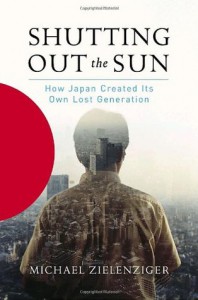Shutting Out the Sun: How Japan Created Its Own Lost Generation
 it's emblematic of 2006 that this book exists, that the focus now is on mental disorder, social withdrawal, the Japan that has gone wrong. few young'uns alive today remember the 1991 spree of "Japan unstoppable" books; or even the 2000 residual afterglow of "Japan supercool" books. by 2010, we have a spate of "Japan gone wrong" books. originally they said it was going to be a lost decade. then they said lost 20 years. now... a lost generation. yeah, since 1991, it's been 22 years of consecutive economic contraction with attendant population collapse. what happened? well... turns out being an elite japanese in a world full of uncivilized roughcut ethnics is a tough thing. nobody produces children any more; just a matter of voluntary extinction. mental illness on the rise; japan also getting obese. or geopolitically, either china or japan is always collapsing??
it's emblematic of 2006 that this book exists, that the focus now is on mental disorder, social withdrawal, the Japan that has gone wrong. few young'uns alive today remember the 1991 spree of "Japan unstoppable" books; or even the 2000 residual afterglow of "Japan supercool" books. by 2010, we have a spate of "Japan gone wrong" books. originally they said it was going to be a lost decade. then they said lost 20 years. now... a lost generation. yeah, since 1991, it's been 22 years of consecutive economic contraction with attendant population collapse. what happened? well... turns out being an elite japanese in a world full of uncivilized roughcut ethnics is a tough thing. nobody produces children any more; just a matter of voluntary extinction. mental illness on the rise; japan also getting obese. or geopolitically, either china or japan is always collapsing??it's like 3% are on antidepressants now. tripling by 2020, according to professionals. by 2030, will be 30% of the population? we'll all be nerve stapled? so yeah, Zielenziger, innocent of the world, completely doesn't notice that some of the people around him are completely deranged. one is, well, i shouldn't spoilt it. but any child could figure it out.
zielenziger: "hey I know what to do! let's affection japan! then she'll stop moping all the time."

i may be hikkikomori, but i'm still japanese
srsly, the work is about the "Lost Generation" of Japan, not in the [b:Speed Tribes|178081|Speed Tribes Days and Night's with Japan's Next Generation|Karl Taro Greenfeld|http://d.gr-assets.com/books/1172456627s/178081.jpg|172025] or in the meth users or the other fantastic ways to go back, but the unique, distinctly Japanese way of withdrawal and disappearance from society. hence, 'hikkikomori' (pulling inward). not a diagnosed mental illness, but simple generation-wide social change. this process invites unintentional comedy. Mr. Zielenziger notes that "cuddling and showing affection to a young man inspires coo-cooing from him and infantile happiness." okay, good point. if we go to a mentally deranged twenty-five year old and stroke him, he may respond to such treatment with childlike joy. but why exactly should we hire people to do this or like consider society's obligation to provide such treatment? affection ain't free, baby.
with the exception of this issue, and Zielenziger's blindness to something he wrote early in the book, the upscale education, lifetime in journalism, and forthright open American style are strong points. I certainly put in the extra cash to ship this book when I had to move a library across countries, so that is an endorsement of sorts. (I did not choose to transfer 'daughter of the samurai' for example)
professional, terse, journalistic, truth-seeking. 4/5


